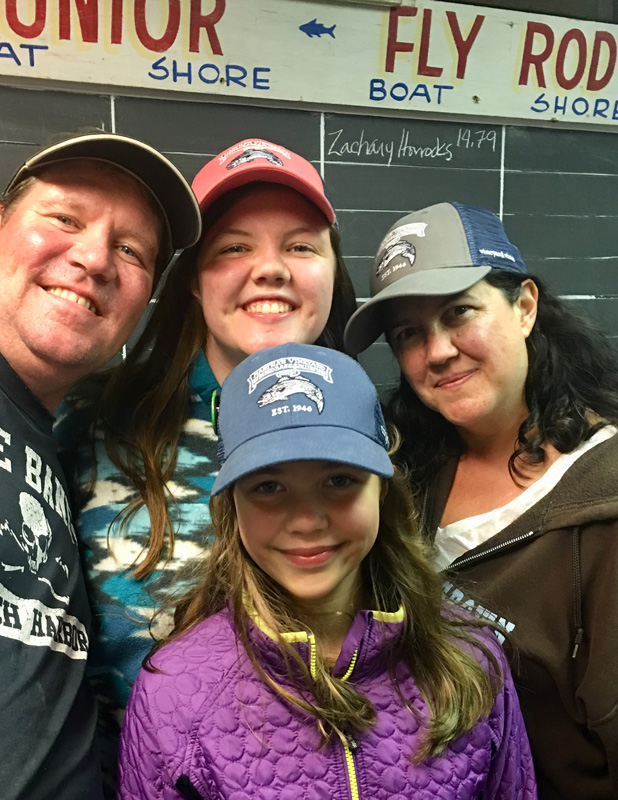The Cabot family, Ben and Nicole, and their daughters Violet and Reed, make their home on a dead-end road in quiet West Tisbury. No matter what’s going on down-Island, or even up the street at the Farmers Market, traffic and congestion never reach their verdant and peaceful oasis: peach and apple trees reaching up toward the summer sun, the blossoms of tomato and pepper plants just giving way to burgeoning fruits. And if you sit still for a moment and look carefully, the secret of their horticultural success becomes clear: All around, honey bees float on the gentle breeze, making their way from flower to flower, slurping their nectar and pollinating while they go.
This is their fourth summer keeping bees, and while Ben does the majority of the day-to-day work, Violet, now 17, spurred the family foray into beekeeping. She learned about colony collapse disorder back in elementary school, and insisted that they do something to help the bees. It was a natural fit, since Ben’s uncle, Andy Boass, kept bees, and they had access to his equipment and expertise. Her now 9-year-old sister, Reed, was just a baby back then, and they struggled to find the time to add another responsibility to their already busy lives. But a few years later, after Andy’s passing, beekeeping became a way for the family to keep their uncle’s memory alive.

Eager to share his love of beekeeping, Ben has offered to introduce me to his colony. He hands me a wide-brimmed hat with an attached veil that covers my face, and, similarly accessorized, he opens the cover of the hive to give me a look inside. With a smooth steadiness that comes partly from his years of practice, but mostly from his naturally calm demeanor, he pulls out one of the frames. The top box, called the honey super, is added in early summer when nectar is plentiful enough for bees to make more honey than they need. Using a soft brush, Ben gently shoos some of the bees off and holds the frame up to the light, showcasing the perfect hexagonal cells, each filled with rich amber honey and capped with beeswax.
After checking the rest of the top frames, he is satisfied that they are making adequate honey, and doesn’t feel the need to disturb them any more. He’ll do a more thorough inspection in early fall, looking for evidence of pests or diseases that might need to be treated before winter. In the summer, he prefers to let them do their thing. His low-interference technique appears to be working. The bees are clearly thriving — finding plenty of forage in the Cabots’ blossom-filled garden, and happily filling frames with the fruits of their nectar-converting labor.

When talk turns to honey harvest, Reed eagerly shouts, “I LOVE spinning!” and makes a cranking motion with her hand to demonstrate. The rest of the family agrees: Spinning day is the highlight of the beekeeper’s year. The whole family (and as many extra able bodies as they can get) comes together, each taking a turn cranking the manual extractor to spin the honey out of the comb, and watch it ooze out a tap into sterilized bottles for storage and, of course, tasting. A chef by nature and by trade, Nicole has no shortage of favorite honey recipes. Spooned into tea, as an addition to sauces and dressings, or drizzled on vanilla ice cream … Not only is honey a flavorful sweetener, it can contains antioxidants, minerals, vitamins, enzymes, and trace amounts of pollen, which can help with seasonal allergies. It’s also soothing for sore throats, and a natural cough suppressant, and she swears by steamed milk with honey and vanilla as an insomnia cure.
As individuals, bees are so vulnerable — easily squashed by a human hand or poisoned by pesticides. But collectively, they accomplish amazing feats of engineering, and produce a magical antibacterial, anti-inflammatory, and delicious elixir. In that way, a bee colony is much like a human family: Alone, humans might be too high-strung or too quiet, too impulsive, or too sensitive. But we have a way of bringing out the best in one another. We give each other the courage to take on projects we thought were impossible, to face loss we thought was insurmountable, and when we find ourselves in sticky situations, the courage to go with the flow.
Kate Tvelia Athearn is a writer, educator, and farmer based in West Tisbury, where she lives with her family.

